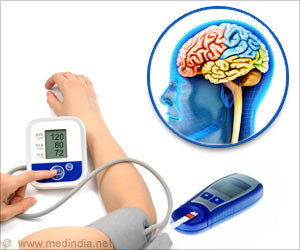- High blood pressure could lead to the development of age-related brain damage
- This is caused by the accumulation of lesions in the white matter of the brain, which can result in cognitive problems
- Intensive control of blood pressure can significantly slow-down the progression of the disease
The study revealed that intensively controlling the blood pressure (BP) was much more effective than standard BP-lowering therapies in slowing the accumulation of lesions in the white matter of the brain. These findings corroborate earlier NIH studies, which showed that intensive therapy significantly reduces the risk of occurrence of mild cognitive impairment.
“These initial results support a growing body of evidence suggesting that controlling blood pressure may not only reduce the risk of stroke and heart disease but also of age-related cognitive loss,” says Dr. Walter J. Koroshetz, who is one of the study leaders. He adds: “I strongly urge people to know your blood pressure and discuss with your doctors how to optimize control. It may be a key to your future brain health.”
Read More..
Study Team
The study team included senior clinical scientists from several institutes under the National Institutes of Health, USA, who jointly led the investigation. These included Dr. Walter J. Koroshetz, MD, Director of the National Institute of Neurological Disorders and Stroke (NINDS); Dr. Richard J. Hodes, MD, Director of the National Institute on Aging (NIA); Dr. Clinton B. Wright, MD, MS, Director of the Division of Clinical Research at NINDS; and Dr. Lenore J. Launer, PhD, a Senior Investigator in the Laboratory of Epidemiology and Population Science at NIA.Brain Pathology and Its Association with Hypertension
The brain is made up of two nervous tissue layers, known as white matter and grey matter. The outer layer of the brain consists of grey matter, which is made up of the cell bodies of nerve cells or neurons. The inner layer of the brain consists of white matter, made up of axons, which are thin nerve extensions originating from the cell bodies of neurons.There are literally billions of axons within the white matter that connect the neurons together. The axons are covered by a fatty layer of myelin that provides protection and insulation and facilitates the rapid conduction of nerve impulses.
White matter lesions can be detected by MRI and are characterized by thinning of the myelin sheath, increased glial cell (supporting cells of the brain tissue) responsiveness to injury, and leaky blood vessels in the brain, as well as increased risk of occurrence of multiple strokes. Importantly, these pathological changes are associated with high BP or hypertension
Verification of the Link between Hypertension and Cognitive Brain Disorders
Several studies have indicated that hypertension can elevate the risk of formation of white matter lesions, as well as the development of cognitive disorders such as Alzheimer’s disease and dementia in later life.These findings were verified in a randomized clinical trial called SPRINT Memory and Cognition in Decreased Hypertension (MIND). This clinical trial, which is considered to be the ‘Gold Standard’, evaluated whether controlling the BP could slow-down or prevent the accumulation of white matter lesions in age-associated brain disorders. The findings have been published in the Journal of the American Medical Association (JAMA).
“These findings on white matter lesions - primarily in the aggressive control of blood pressure - are encouraging as we continue to advance the science of understanding and addressing the complexities of brain diseases such as Alzheimer’s and related dementias,” says Hodes.
Key Features of the SPRINT Study
- The NIH-supported SPRINT study, conducted between 2010-2015, evaluated the effect of standard BP control versus intensive BP control on cardiovascular health and mortality
- Over 9,300 adults aged 50 years and above at high risk of developing cardiovascular disease (CVD) were included in the SPRINT cohort
- The cohort was divided into the following two groups:
- Group 1: Received standard BP-lowering medication
- Group 2: Received intensive BP-lowering medication
- The results showed the following:
- Group 1: Standard therapy lowered the systolic BP below 140 mmHg
- Group 2: Intensive therapy lowered the systolic BP below 120 mmHg
- 3.3 years of intensive therapy significantly reduced the incidence of CVD and mortality
Key Features of the SPRINT MIND Study
- The SPRINT MIND study was initiated by NIA and NINDS, which included 27 clinical sites
- The SPRINT MIND study evaluated the effect of BP-lowering therapies (standard or intensive) on cognitive function of the brain through MRI
- 449 participants underwent MRI at enrollment and after 4 years
- During the 4-year span, the average volume of the white matter lesions was measured by MRI
- The results showed the following:
- Intensive Therapy Group: Average increase in the total volume of white matter lesions was 0.92 cm3
- Standard Therapy Group: Average increase in the total volume of white matter lesions was 1.45 cm3
- Brain volume slightly decreased in the intensive therapy group compared to the standard therapy group
Future Plans
The scientists conducting the SPRINT MIND study are planning to evaluate the effect of controlling the BP on the formation of white matter lesions in vital areas of the brain that are affected by age-related brain disorders. Moreover, they intend to elucidate the underlying reasons why some patients are more responsive to treatment than others.Concluding Remarks
The SPRINT MIND study clearly showed that intensive therapy significantly reduced the accumulation of brain white matter lesions arising from hypertension.“SPRINT MIND has produced promising initial results in the battle against the nation’s growing problem with aging brain disorders. Both the brain scans and the cognitive tests reinforce the potential benefits that intensive blood pressure management may have on the brain,” says Launer. She adds: “We hope that these findings will become the foundation for future studies on how to protect the brain throughout a person’s life.”
Funding Source
The study was part of the National Institutes of Health’s Systolic Blood Pressure Intervention Trial (SPRINT), which was jointly funded by the National Heart, Lung, and Blood Institute, the National Institute on Aging, the National Institute of Diabetes and Digestive and Kidney Diseases, the National Institute of Neurological Disorders and Stroke, and the United States Department of Veterans Affairs, USA. Takeda Pharmaceuticals provided the drugs azilsartan and chlorthalidone.Reference:
- Intensive blood pressure control may slow age-related brain damage - (https://www.ninds.nih.gov/News-Events/News-and-Press-Releases/Press-Releases/Intensive-blood-pressure-control-may-slow-age)
Source-Medindia
















